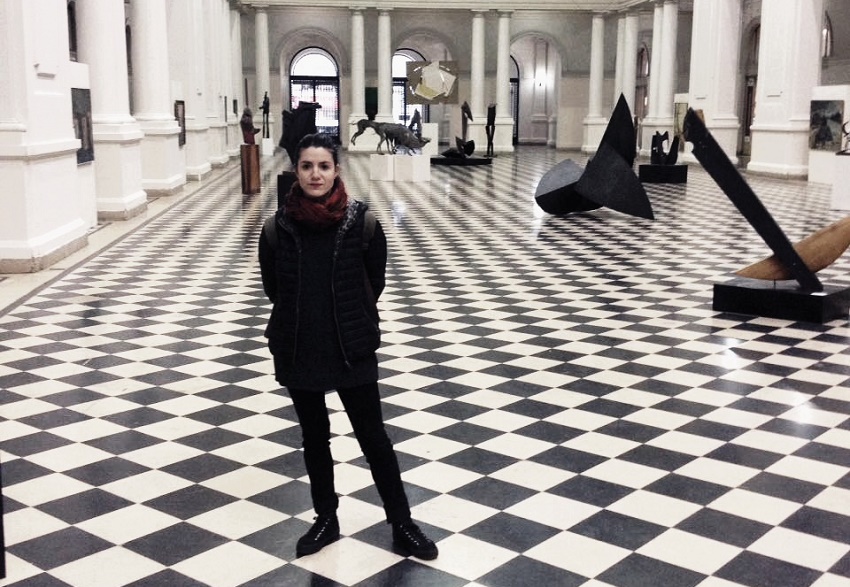Sabrina Otegui / Buenos Aires, Argentina. Before coming to Argentina, Iraia Elias didn’t know much about the Basque diaspora. She says that it was really by coincidence that she chose Buenos Aires as a destination. But her concern to delve into the Lecoq theater technique brought her here, where she has found an entire world, in regards to the Basque culture as well as discipline of theater. The actress says that she was interested in the Lecoq methodology and began “to look for schools where she could study. There were options in Barcelona and Berlin, but those were two-year long courses, but I was looking for something shorter. I found this school in the internet. The Provincial Government of Gipuzkoa gives scholarships to study dramatic art, dance and other disciplines. I applied and they gave me one. And so it became a wonderful opportunity. In life sometimes you have to make a decision, and all of the sudden you end up in Buenos Aires,” she explained smiling.
The culture in Buenos Aires
Iraia only had superficial references about Argentina, but she did know that she would find interesting cultural movement in the country, and particularly in Buenos Aires. “I have never had any relationship with Argentina, but I was always attracted by the important cultural movement that exists here. This was another reason to come. The course is very intensive and I spend a lot of time at school, but during my free time, I try and see theater works, and there are so many! At every one, there is something to learn.”
“I was impressed by the large audiences that theater draws. You go to see a work and there are always people; in the Basque Country, it isn’t like that. There, especially if you perform for example in cultural centers or in the “gaztetxes,” you never know how many people will come to watch. There isn’t the tradition of going to the theater. Here it is a delight, people go to the theater and this is to be welcomed. When you present a work it is nice to know that you will have an audience that will see it. What a luxury.”
Audience, larger and different
The difference between audiences here and in the Basque Country isn’t only quantitative. According to the actress, who was nominated for a Goya prize, "people also react differently and this also catches your attention: In Argentina, as well as in Uruguay, when I was at a film festival, I was struck by the same. After the film, people began to ask questions and make comments. This doesn’t happen in Euskal Herria. There, in these kind of situations, the people stay quiet, and it is harder to make them participate. Here they get into the subject and share their points for view.”
“Amama” in the Diaspora
Taking advantage of her stay in Argentina, and invited by Carlos Gabilondo, director of the Basque Film Series, Iraia attended the screening of her film at Euskaltzaleak in Buenos Aires, as well as Euskaldunak Denak Bat in Arrecifes. She also participated in the Cinvevasc series, organized by the Basque language and culture Lecturer at the National University of La Plata. There she got other perspectives on the film. “I think that Amama is a film that comes very easily to the audience because it treats universal themes. But of course, there is a plus. Here people see their relationship with Euskal Herria in the film, its history, their roots…when they see the film, they recuperate their history and this is very interesting.”
The Diaspora and the Basque Country
“I wasn’t familiar with the Diaspora before I came here and I think that the Basque Country doesn’t know it well. Yes, we are aware of the euskal etxeas, and that many Basques came here, above all to Argentina. But it seems to me that between the Diaspora and the Basque Country, stronger ties are missing. I think that one feels very far away from the other. It is too bad, since the Diaspora is so strong. With so many people interested in Euskera, and committed to the Basque culture….You can see it in centers and also at “Buenos Aires Celebrates,” at such a huge festival with so many people…” “But I don’t know if it reaches the Basque Country, and I think that in many areas things from there don’t reach here either. They are like two worlds, and it would be great if ties between them would become stronger.” With the tools that exist today, it should be easy; now we’re not like the sheepherder who came 100 years ago, now it is a lot easier, for people there to get to know here and vice versa. I think that people there have a lot to learn, and to enrich those ties.”
“When seeing the movement in the Diaspora, a lot of questions come to me. Questions about the immigrants that came, what was the process like, under what conditions. For me, now, it was easy to come and get settled….but how did these others who left their homelands experience it…?” “In Montevideo, for example, I realized the number of streets with Basque names. And that impressed me….it makes me ask myself, who were these Basques who came….It is clear that some were very important and influential in local history…and more questions come to me, of all kinds. It is a very interesting topic that needs to be reflected on,” she concludes.






 Send to a friend
Send to a friend Add comment
Add comment








